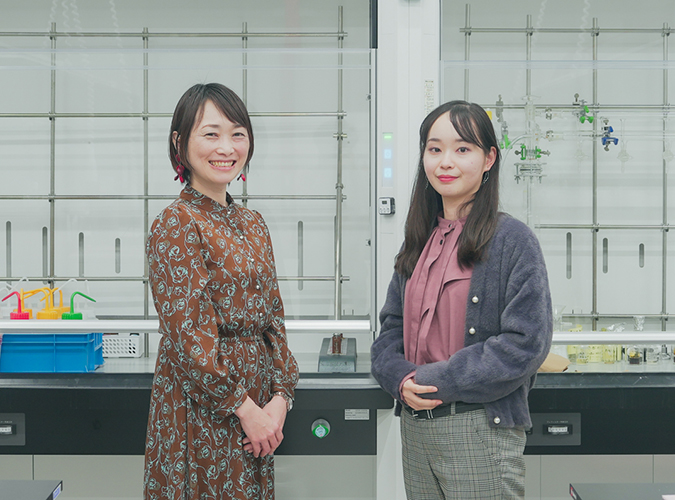努力で言葉と文化の壁を越え、日韓の架け橋を目指し、「誠実さ」を信条に臨んだ就職活動
(ジョン チャンミ)

OVERTURE
JUNG CHANMIさんは、一度は韓国の大学に進学した後、日本の大学に留学したいと猛勉強し、1年間で「日本語能力試験(JLPT)」のN1に合格した努力の人です。誠実な人柄で、高い日本語能力を強みに、青山学院大学で充実した留学生活を送っています。卒業後は、日韓の架け橋を目指して三菱電機株式会社の自動車機器事業本部に就職予定です。留学を決意してから今まで、どのように日本社会で道を切り拓いてきたのか、お話を伺いました。
家族の思いと共にソウルから日本留学を目指す
高校生の時、マレーシアでボランティアを経験し、民族間で大きな経済格差があることを知りました。将来は、メディアを通じて貧困問題や社会問題の解決に携わる人々の強い“思い”を社会に届けたいと考え、ソウル郊外の大学のメディアコンテンツ学部に進学しました。しかし、毎日往復5時間の長距離バス通学は想像以上に過酷で、人生の意味を問うようになりました。
当時、兄がカナダに留学中で、充実した日々を過ごしていることも刺激となり、「私も留学して、新しい人生を歩みたい」と考えるようになりました。父が日本留学を経験していたことから、家族で何度も日本各地を旅行した感動が心に浮かびました。毎日の通学バスの中で「日本に留学したらどんな人生になるのだろう?」と考え始め、どのようにしたら日本に留学できるかを徹底的に調べました。
経済的負担や家族の病気、私自身の日本語力などの問題から、簡単に実現できる留学ではありませんでした。しかし、そんな思いを察してくれた父が「ひたすら悩むより、とにかく日本に行って経験してみなさい」と背中を強く押してくれ、まず東京の日本語学校に入学することにしました。
住居はシェアハウスで、初めて家族と離れ他人と共同生活を送ることになり、言葉が通じない慣れない外国での暮らしにホームシックにもなりました。「日本の大学に行きたいなんて、とんでもない夢を持っているのではないか」と思うこともありましたが、日本に送り出してくれた家族のことを思うたびに、途中で投げ出したり逃げたりすることは絶対にできないと決意を新たにしていました。

日本語力ほぼゼロで来日、猛勉強して1年間で日本語能力試験(JLPT)のN1に合格
日本語力はほぼゼロだったので、日本語学校での習熟度別クラスは下から2番目のクラスを指定されました。毎朝誰よりも早く登校し、夜は学校が閉まるまで残って自習し、休日もカフェなどで休まず、ひたすら日本語の猛勉強を続けました。努力しただけ着実に日本語が理解できるようになることを楽しく感じました。学習の到達状況を客観的に確認できる検定や資格試験に挑戦することが好きな性格が、日本語力の向上に役立ちました。来日後1年で、多くの日本の大学で外国人留学生入試の出願要件となる「日本語能力試験(JLPT)」のN1に合格することができました。
日本でも映像制作を学びたかったので、ある大学の芸術学部の留学生入試に2回挑戦しましたが、日本人でも狭き門であるその大学には合格できませんでした。東京の映画制作専門学校に入学し、同世代の日本人学生とグループワークで本格的な映像制作に取り組んでいました。そんな中、皆でロケーション撮影の段取りをしているとき、日本社会で生きていく上での価値観を大きく変える出来事がありました。
ドキュメンタリー制作のグループワークで、自分なりに頑張っていたつもりでしたが、日本人のメンバーから「外国人だから頼りにくい」と言われたことがありました。その言葉に衝撃を受け、「私は外国人だから役に立たないかもしれない」という不安から、撮影に関する交渉業務を避けていた時期もありました。しかし、日本人との関わりの中で、この問題から逃げるわけにはいかないと考え直し、それを機に、日本人の友達とのグループワークではお互いにしっかりとコミュニケーションを取り、葛藤を乗り越えるよう努めました。次第に、「日本人と外国人の区別を超えて、共に進むことが大切だ」と気付くようになりました。
専門学校で充実した時間を過ごしましたが、「国際社会の諸問題に取り組む人々の強い“思い”を社会に届ける作品を作りたい」と思った原点に立ち返ったとき、新たな問題意識が芽生えました。ドキュメンタリー映像は、社会問題を構造的に捉えて提示することによって、問題・課題を可視化することが求められます。しかし、当時の私には社会問題を理解するための教養や知識が十分ではない、という限界を感じました。「やっぱり大学で学びたい!」という思いが再燃し、国際関係や社会問題を学べる大学を探しました。青山学院大学の国際政治経済学部は、政治・経済から異文化のコミュニケーションまで幅広く学べる点や、渋谷という立地の良さが魅力でした。日本留学を決意して来日してから青学に入学するまで、約3年の月日がかかりました。
 青山学院大学に入学した直後に意気投合した親友と一緒に
青山学院大学に入学した直後に意気投合した親友と一緒に
言葉の壁を越え、国際社会の諸問題を知り、異文化コミュニケーション研究に取り組む
青学に入学して、授業を聞いて理解することには困りませんでしたが、レポート課題などアウトプットには多くの努力が必要でした。当初は、まず韓国語で書き上げてから日本語に翻訳していたので、日本人学生の2倍の時間がかかっていたと思います。語彙力や表現力を向上させるには、日本語でたくさん「読む」ことです。授業に関連する文献はもちろん、自然な日本語表現を身に付けるために、小説を読んで学びました。読むことに慣れてくると、読解力や読む速度も向上してきます。3年次になると、レポートは最初から日本語で書けるようになりました。
知識とともに考える力が身に付いたと感じた授業は、2年次に他学部科目で履修した「人権法Ⅰ・Ⅱ」です。法学部のこの科目は、紛争や貧困といった人権を脅かす社会問題の現状を、構造的に考える授業です。大学で国際問題を学びたいと専門学校からキャリアチェンジを考えた原点に、正面から取り組む内容でした。先生は、学生の問題意識や意見は小さなことでも尊重し、多様性を重んじる方針を示してくださったので、勉強した内容をもとに自分自身の考えを深く自由に考察することができました。
この授業で学んだことは、現在進めている、異文化間コミュニケーションをテーマにする末田清子先生のゼミナール(ゼミ)での卒業論文にも多く取り入れています。末田先生のゼミでは、人と人、人と社会、社会と社会のコミュニケーションを多角的に考察する発表とディスカッションが、先生を交えて積極的に行われています。多様なテーマや意見に触れることができ、ゼミならではの面白さや刺激を味わっています。論文を読むことや発表内容を考えることが楽しく、わかりやすい発表の方法もご指導いただき、インプットとアウトプットの両面で大きく成長できたという実感があります。
また、コミュニケーション研究法の基礎を体系的に学ぶことができる「社会調査士」の資格取得を奨励してくださるので、私も必要単位を修得し、社会調査士(在学中は「社会調査士(キャンディデイト)」)の資格もとることができました。社会や市場から集めた情報を正しく読み解く力は、学業だけでなく就職後にも役立つのではないかと考えています。
3年次の発表では、親子関係のコミュニケーションに関するテーマを選びました。現在、同じ興味を持つゼミ生2人とグループを組み、離婚家庭におけるコミュニケーションと子どものウェルビーイングをテーマに、卒業論文に必要な調査を進めています。当事者へのインタビューで集めた発話を文字データとしてまとめ、その内容を分類する「コード化」の作業を行っています。今後、3人の調査を合わせて意見交換を行い、各自が卒業論文としてまとめる予定です。多くの先行研究では、離婚家庭で育った子どもに対するマイナスの影響が取り上げられていますが、私たちはプラスの面にも焦点を当てたいと考えています。
 卒業論文に向けて、ゼミの3人でグループ作業中(右がジョンさん)
卒業論文に向けて、ゼミの3人でグループ作業中(右がジョンさん)
外国人の視点は他の人とは異なる発想で日本企業に貢献できる、という気付き
日本で「外国人」として働くのはハードルが高いというイメージがあり、卒業後は韓国に戻って就職するのだろう、と思っていました。しかし、周囲がインターンシップのエントリーなど就職活動を始める時期になると、ゼミメンバーと将来について話し合うことが多くなり、卒業後の進路について具体的に考えるようになりました。
日本の友人や韓国の友人とたくさん話し合う中で、外国人としての価値観を持つ私だからこそ、他の人とは異なる発想ができ、日本企業で自分にしかできない貢献ができるかもしれない、と考えるようになりました。外国人として働くことが、むしろ強みだと思えたのです。
青学に入学する前から、寿司チェーン店で調理補助のアルバイトを5年間続けており、日頃から目上の方と接するときは正しい敬語を使えるよう意識して勉強してきました。また、バイトリーダーを任されているので、社員の方と円滑なビジネスコミュニケーションを取れるようになりたい、TPOに適った日本語を話せるようになりたいという向上心を持って、ビジネス日本語能力テストの受験もしていました。そのため、就職活動の段階になって、日本語に困ることはありませんでした。
3年次の秋には1dayインターンシップや学内の企業説明会に参加して、自分に向いた業界を考え始めました。努力の結果を可視化することが好きな私は、技術や努力をカタチにして社会に還元できる業界に魅力を感じ、ものづくりに携われるメーカーに絞って就職活動を進めました。特に、日本が世界に誇る自動車産業は、外国人として日本で働く上で、強い興味を持ちました。
就職活動が進んでいくうちに、私の課題は採用面接で端的にわかりやすく話すことだと気付きました。進路・就職センターの面接対策での指導が本当に役に立ちました。10回以上、正確には覚えていないほど面談を受けましたが、毎回、別のカウンセラーの方から指導を受けることで、「面接官によって多様な視点がある」ということに気付きました。いただいたフィードバックをもとに改善を繰り返し、最終的に簡潔でわかりやすく話せるようになりました。就職試験の本番で、上手く話せたという手ごたえを感じられたとき、心の中で「やった!」と思い、嬉しかったです。
 ゼミの仲間と。青山キャンパス周辺はおしゃれな飲食店が多く、友人といろいろなお店をめぐるのも楽しい(後列左がジョンさん)
ゼミの仲間と。青山キャンパス周辺はおしゃれな飲食店が多く、友人といろいろなお店をめぐるのも楽しい(後列左がジョンさん)
日本と韓国の架け橋となる運命を感じた三菱電機の自動車機器事業への挑戦
内定をいただいた三菱電機株式会社の自動車機器事業本部は、韓国の大手自動車メーカーの部品調達を行っていて、韓国人である私が貢献できると運命を感じた企業です。就職後は、営業職として携わる予定で、日本の優れたものづくりの技術と韓国の重要な産業との架け橋になれることが楽しみです。また、三菱電機は、ホームエレクトロニクス事業や通信事業、エネルギー事業など、幅広い事業をグローバルに展開しているので、将来的には、自動車機器事業だけではなく他の事業に異動できることも魅力です。
日本と韓国では、大学生の就職活動の事情がかなり異なります。韓国では、即戦力としてのスキル、特にTOEICスコアや学業成績が重視される文化があり、競争が非常に激しいです。就職活動のために休学することも珍しくありません。
一方、日本では語学力や学業成績ももちろん重要ですが、「学生時代に力を入れたこと」といった大学生としての経験や人柄も考慮され、華やかな経験がなくても、希望する仕事に挑戦できる点が魅力です。学業を大切にしながら5年間同じアルバイトを続け、向上心を持って職場に貢献した経験が、自分の誠実さを伝えるエピソードとなりました。
卒業後の目標は、日本社会にしっかりと根を下ろして定着することです。もっと日本語を上達させて、企業と社会に貢献できる人になれるよう、誠実に努力していきます。
 イチョウが色付く頃のキャンパスの風景がとても気に入っている
イチョウが色付く頃のキャンパスの風景がとても気に入っている
JUNGさんの就職活動スケジュール
-
<3年次> 2023年 9月〜
重工メーカーone dayインターン等に申し込み・参加
-
<3年次> 2023年 10月〜
学内の説明会参加を開始。内々定をいただく直前まで、企業研究や自己分析を繰り返す
-
<3年次> 2024年 1月〜
本格的にSPIの勉強、説明会参加
-
<3年次> 2024年 2月下旬〜3月
本選考の準備、進路・就職センターで、ESや面接の指導を受ける
-
<4年次> 2024年 4月
三菱電機株式会社から内々定をいただく
※各科目のリンク先「講義内容詳細」は2024年度のものです。
国際政治経済学部 国際コミュニケーション学科
青山学院大学の国際政治経済学部は国際社会への貢献をそのミッションとし、国際系学部の草分けとして創設されました。各学科の学びを深めるだけでなく、有機的に3学科の学びを統合することもできます。グローバルレベルの課題への理解を深め、エビデンスにもとづいて議論・討論するスキルを養成します。世界の多様な人々と協働し、新たな価値を創造する実践力を育みます。
国際コミュニケーション学科では、激変する国際社会において政治学的・経済学的な視点からだけでは扱いきれない国際事象を学問領域として学修・研究します。異なる文化への理解と他者との共存について考え、国際社会が抱える諸問題の解決に貢献できる人材を育成します。卒業生は国際渉外・広報、各種海外協力事業団、通訳・翻訳、マスコミ業界などさまざまなフィールドで活躍しています。




















































































































































































































































































































































































